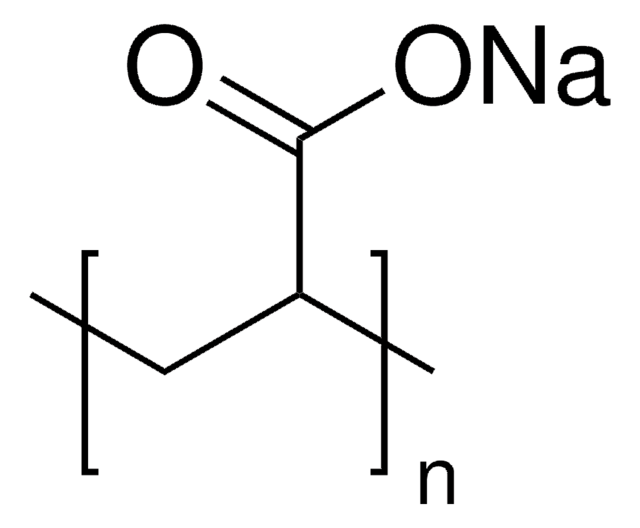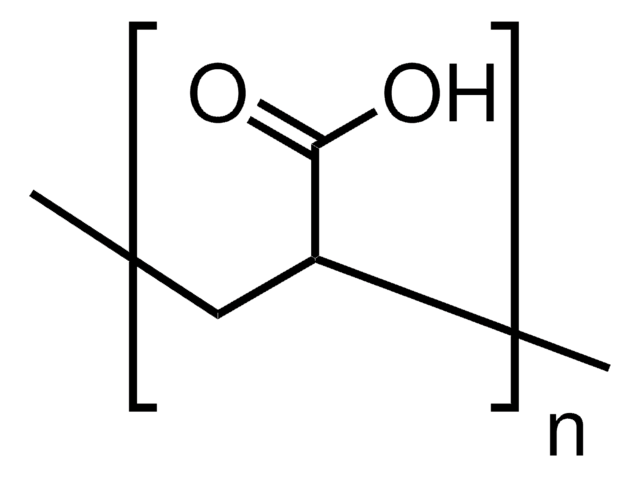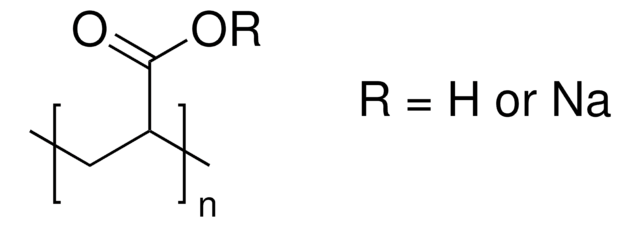416029
Poly(acrylic acid, sodium salt) solution
average Mw ~8,000, 45 wt. % in H2O
Synonym(s):
PAA, Sodium polyacrylate
About This Item
Recommended Products
form
viscous liquid
mol wt
average Mw ~8,000
concentration
45 wt. % in H2O
refractive index
n20/D 1.428
density
1.3 g/mL at 25 °C
SMILES string
[Na]OC(=O)C=C
InChI
1S/C3H4O2.Na/c1-2-3(4)5;/h2H,1H2,(H,4,5);/q;+1/p-1
InChI key
NNMHYFLPFNGQFZ-UHFFFAOYSA-M
Looking for similar products? Visit Product Comparison Guide
Related Categories
Application
- Poly(acrylic acid) Hydrogel for Mucoadhesives: This study focuses on the radiation crosslinking of poly(acrylic acid) to create a bioadhesive hydrogel, which can be crucial for drug delivery applications, especially in mucoadhesive drug delivery systems (YC Nho, JS Park, YM Lim, 2014).
- Hydrogel for Dye Removal: Development of a poly(acrylic acid) based hydrogel with fast adsorption rates and high capacity for removing cationic dyes, relevant for environmental cleanup and potentially for purifying biological fluids in pharmaceutical processes (Z Yuan, J Wang, Y Wang, Q Liu, Y Zhong, Y Wang, 2019).
- Composite Hydrogels for Swelling Properties: Investigation into poly(acrylic acid-co-acrylamide) composite hydrogels, studying their swelling properties which are essential for understanding the behavior of hydrogels used in drug delivery systems and tissue engineering (WM Cheng, XM Hu, YY Zhao, MY Wu, ZX Hu, XT Yu, 2017).
Signal Word
Warning
Hazard Statements
Precautionary Statements
Hazard Classifications
Eye Irrit. 2
Storage Class Code
10 - Combustible liquids
WGK
WGK 3
Flash Point(F)
Not applicable
Flash Point(C)
Not applicable
Personal Protective Equipment
Choose from one of the most recent versions:
Certificates of Analysis (COA)
Don't see the Right Version?
If you require a particular version, you can look up a specific certificate by the Lot or Batch number.
Already Own This Product?
Find documentation for the products that you have recently purchased in the Document Library.
Customers Also Viewed
Articles
Layer-by-Layer (LbL) Assembly, A "Gentle Yet Flexible" Method Toward Functional Biomaterials
We present an article that discusses two applications in particular; first, using these layers as polyelectrolyte membranes to control permeability.
Our team of scientists has experience in all areas of research including Life Science, Material Science, Chemical Synthesis, Chromatography, Analytical and many others.
Contact Technical Service



